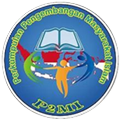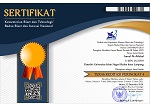THE SIGNIFICANCE OF PRE-MARRIAGE COURSES IN THE PERSPECTIVE OF ISLAMIC COMMUNITY DEVELOPMENT
Abstract
The Ministry of Religious Affairs has formulated the Regulation of the Director General of Islamic Public Guidance No. DJ.II/542 of 2013 concerning Guidelines for the Implementation of Pre-Marriage Courses, which are applied at the Office of Religious Affairs of Tanjung Karang Timur District. This research aims to know how far the level of significance of pre-marriage courses is to people of marriageable age as a form of increasing understanding of the community from the perspective of Islamic community development. The approach used is a qualitative approach. Data is sourced from primary, secondary, and population and sample data. The population is 16 pairs of prospective brides or 32 people, and the sample is 8 pairs of prospective brides or 16. With data collection techniques such as interviews, observation, documentation, and data analysis. Based on the results from research on the implementation of pre-marital courses and the processes carried out, it can be concluded that pre-marital courses are beneficial and necessary for the community. Community development aims to improve the quality of life of the community through the awareness process, the capacity-building process, and the enrichment process. It is significant for creating a Sakinah family.
Keywords
Full Text:
PDFReferences
Afrizal. “Implementasi Kursus Pra Nikah Dalam Mengurangi Angka Perceraian Di Kua Pringsewu.” Ijtimaiyya: Jurnal Pengembangan Masyarakat Islam 10, no. 1 (2017): 97–120.
Aziz Muslim. Dasar-Dasar Pengembangan Masyarakat. Yogyakarta: Samudra Biru, 2012.
Berger, Peter, and Thomas Luckmann. “The Social Construction of Reality.” In Social Theory Re-Wired, 92–101. Routledge, 2023.
Bhattacharyya, Jnanabrata. “Theorizing Community Development.” In 50 Years of Community Development Vol I, 51–80. Routledge, 2020.
Direktur Jenderal Bimbingan Masyarakat Islam. Peraturan Direktur Jenderal Bimbingan Masyarakat Islam Nomor : DJ.II/542 Tahun 2013 (2013).
Dumasari. Dinamika Pengembangan Masyarakat Partisipatif. yogyakarta: pustaka pelajar, 2014.
Evans, Catherine J, Lucy Ison, CLARE Ellis‐smith, Caroline Nicholson, Alessia Costa, Adejoke O Oluyase, Eve Namisango, Anna E Bone, Lisa Jane Brighton, and Deokhee Yi. “Service Delivery Models to Maximize Quality of Life for Older People at the End of Life: A Rapid Review.” The Milbank Quarterly 97, no. 1 (2019): 113–75.
Fauziah, Nailul. “The Concept of Family’s Harmony in Multiple Cultural Settings, What about the Family Harmony with Autism Children in Indonesia? A Literature Study.” The Family Journal 28, no. 4 (2020): 365–70.
Fredian Tonny Nasdian. Pengembangan Masyarakat. Jakarta: Yayasan Pustaka Obor Indonesia, 2019.
Jember, Shidiq. “Management Of Islamic Education In The Family: Career Women Strategy In Building Sakinah Family In Islamic And Gender Perspective At State Islamic University Kiai Haji Ahmad.” Journal of Positive School Psychology Http://Journalppw. Com 6, no. 8 (2022): 2247–58.
Minello, Alessandra, Sara Martucci, and Lidia K C Manzo. “The Pandemic and the Academic Mothers: Present Hardships and Future Perspectives.” European Societies 23, no. sup1 (2021): S82–94.
Nasution, Khoiruddin. “The Roles of Families in Combating Drugs Uses, Violence and Terrorism.” Samarah: Jurnal Hukum Keluarga Dan Hukum Islam 5, no. 1 (2021): 23–46.
Noor, Juliansyah. Metodologi Penelitian. Jakarta: PT. Fajar Interpratama, 2011.
“Pengertian Signifikan Dan Perbedaannya Dengan Signifikansi,” 2021.
Ramulyo, Idris. Hukum Perkawinan Islam Suatu Analisi Dari Undang-Undang No 1 Tahun 1974 Dan Kompilasi Hukum Ilsam. Jakarta: PT Bumi Aksara, 1999.
Schäfer, Thomas, and Marcus A Schwarz. “The Meaningfulness of Effect Sizes in Psychological Research: Differences between Sub-Disciplines and the Impact of Potential Biases.” Frontiers in Psychology 10 (2019): 813.
Suhaimi, Ahmad. Pengembangan Dan Pemberdayaan Masyarakat: Konsep Pembangunan Partisipatif Wilayah Pinggiran Dan Desa. Yogyakarta: Deepublish, 2016.
Tarigan, Amiur Nuruddun & Azhari Akmal. Hukum Perdata Islam Di Indonesia :Studi Kritis Perkembangan Hokum Islam Dari Fikih, UU No. 1/1974 Sampai KHI. Jakarta: Kencana Prenada Media Group, 2004.
Warner, W Lloyd, Marchia Meeker, and Kenneth Eells. “Social Class in America.” In Social Stratification, Class, Race, and Gender in Sociological Perspective, Second Edition, 240–47. Routledge, 2019.
Widodo, Hendro. “The Role of School Culture in Holistic Education Development in Muhammadiyah Elementary School Sleman Yogyakarta.” Dinamika Ilmu 19, no. 2 (2019): 265–85.
Zakiyyah Iskandar. “Peran Kursus Pra Nikah Dalam Mempersiapkan Pasangan Suami Isteri Menuju Keluarga Sakinah.” Jurnal Al-Ahwal 10 (2007).
DOI: http://dx.doi.org/10.24042/ijpmi.v16i2.19025
Refbacks
- There are currently no refbacks.
Jurnal Ijtimaiyya is licensed under a Creative Commons Attribution-ShareAlike 4.0 International License.






1.png)
11.png)
.png)


